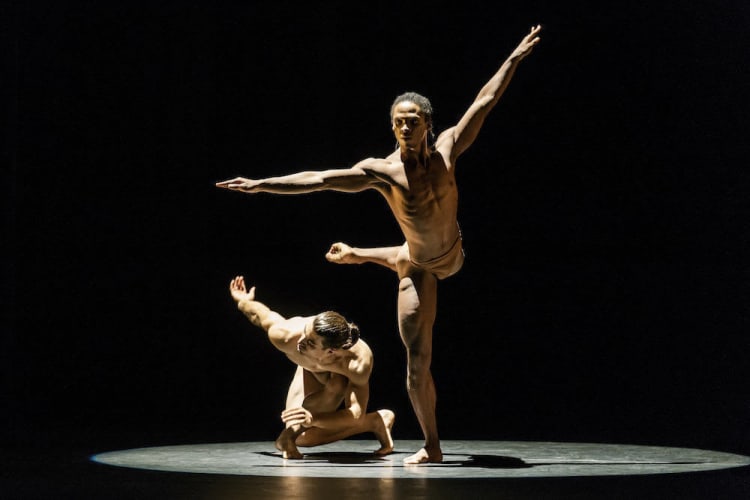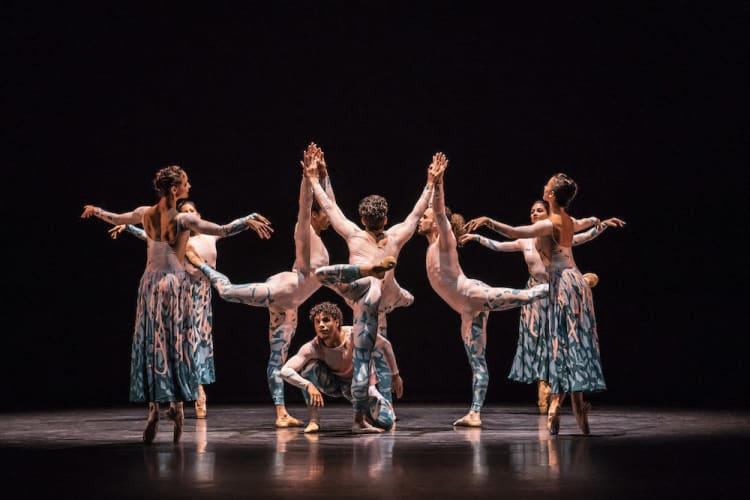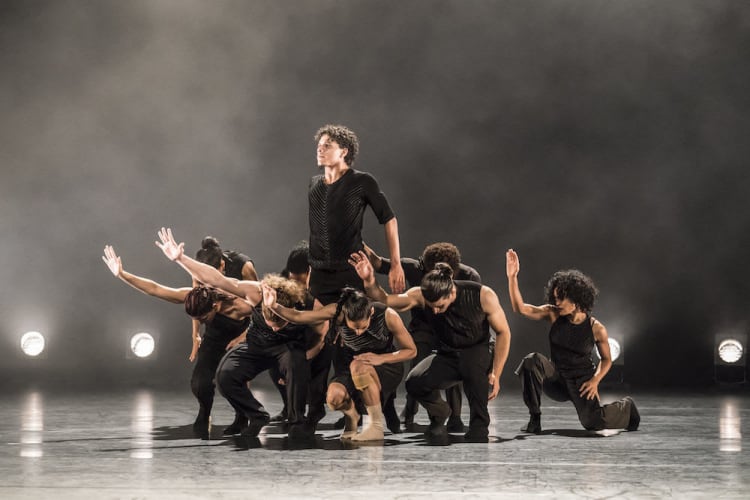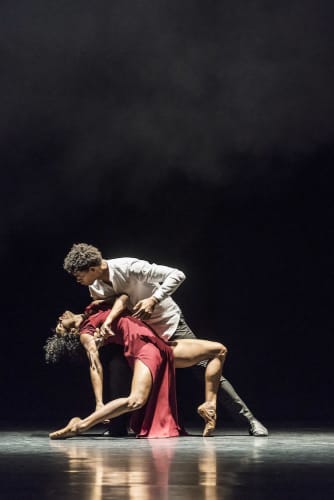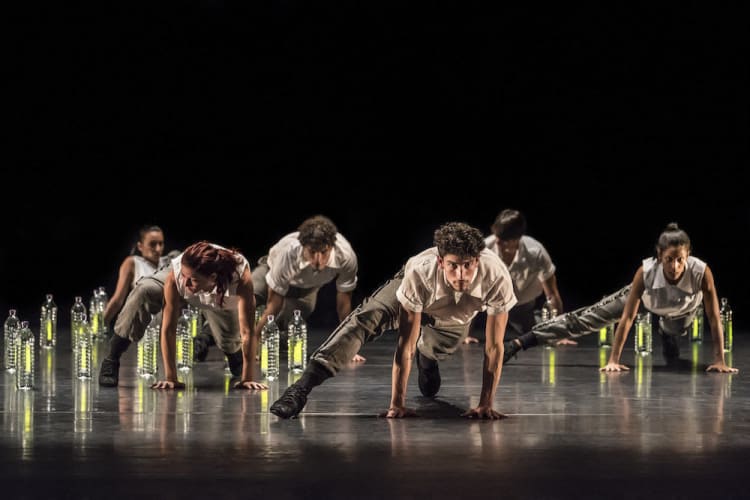Carlos Acosta’s astute programming eases us into our appreciation of his beautiful young dancers. A new company of fourteen dancers, eight men, six women, five numbers (two Sadler’s Wells premières) choreographed by one woman and four men, Acosta Danza’s Debut, 100 minutes of impressive dance, talent and dedication shining, plays the audience very well.
El Cruce Sobre El Niágara (The Crossing Over Niagara) by Marianela Boán, founder of Danza Contemporanea de Cuba, is a meditation on the human form. To Olivier Messiaen’s contemplative cello and piano, two strong, supple, honed bodies, muscles defined in every weight shift, anatomy / life drawing studies, ancient Greek gymnast bas reliefs, Vitruvian men, come slowly together as one, in a twenty-four-minute long exposition.
Carlos Luis Blanco negotiates a rectangle of light as if it were a tightrope to reach Alejandro Silva curled on the ground. God’s foot touches Adam into life. Lifts, deep pliés, strongman totem pole acrobatics, mirror images, tangles and a blending, andante and allegro, they fly off into Carlos Repilado’s blue light as one.
Justin Peck’s (NYC Ballet) eighteen-minute neoclassical Belles-Lettres brings elegiac nineteenth century romance into the picture. Costumes dipped in flowering everglades, César Franck’s lyrical music: both speak of an impulsive dream world, a dramatic midsummer’s night dream world.
Four elegant couples waft and flow in daisy chains and pas de deux under the control perhaps of an impish Puck or an Ariel (Mario Sergio Elías outstanding) only to return later with hair unpinned in post coital abandon…
Fine dancers I have in capitals in my notes, beautifully schooled. But it's the interval already, these two numbers a mere taster of more to come. Stringing us along pleasantly, no punch to the solar plexus yet.
After the interval Goyo Montero’s twenty-five-minute Imponderable puts an infectious spring into the soul and body. I want to dance to the soundtrack, to Silvio Rodriguez’s songs. He is considered Cuba’s John Lennon, but I’d have guessed that.
What I can’t guess are the words, my Spanish not being quick enough to catch them, and they are important. One has to read them from the body language of the nine dancers in black telling an episodic tale, strung together from his pearls.
Dark night, torches, smoke machines and Owen Belton’s medley arrangement of Rodriguez tell a noir tale difficult to decipher, but then the clue is in the title. Are they in purgatory, a halfway house? What are they seeking? Low on the floor, moody, troubled, they circle the stage. Street dance, strong beats, great coordination, electrified moves. Is that a blind man? Is this an earthquake? Are they zombies?
Acosta says he wants something for everyone, and of course he has always loved street dance. Dance theatre, too. His fifteen-minute duet with Marta Ortega is just that. Sidi Larbi Cherkaoui’s Mermaid is a touching tender adult fairy tale, given enchantment by Woojae’s Park’s on stage geomungo, his six-stringed Korean zither, which he plucks and bows.
Loose-limbed Ortega in a Hussein Chalayan red dress, empty wine glass in hand, sways and staggers on pointe shoes. Acosta is at her side, his big beautiful hands (Cherkaoui as always homes in on eloquent dancing hands) ever ready to catch her, his broad shoulders to take her slight tipsy weight.
A troubled girl, she flops and headstands; he patient, almost at the end of his tether, but faithful, as she slithers and slips out his hands. Again the drama is in the song. She leaves, he dances a solo, leaps (Acosta can still do it) and martial kicks. She returns barefoot, stumbles into a joyful duet. It is his turn to leave. And then so does she. He returns with that empty wineglass—to catch the drips from the ceiling.
The audience falls for this one, unrequited love and all that. But it’s the last one that has them exclaiming out loud, Jorge Crecis’s Twelve, an eighteen-minute rhythmic and algorithmic parade or sports ground drill with thirty-six shimmering full plastic water bottles. Bottles are arranged in varying code sequences on the floor, as are the teams.
In khaki trousers and white shirts, shouting out their numbered places, the twelve run, jump and throw bottles on the move, catching (mostly) the overhead and risky blind throws of the bottles. A game of double dare, speed, co-ordination and timing, and Vicenzo Lamagna’s electro-acoustic score heightens the tension as it triggers each new drill.
Formation crouches, never still, commando training camp, missiles fly, this looks fun, but what if one hit its mark, bottle trajectories longer and longer, crisscrossing in flight, more and more complex. Psychedelic music, funky beat, the moves become frenetic, and, I overhear, “gobsmacking cool”... Ingenious, I’d say.
Is there anything Carlos Acosta can’t do: classical ballet star, principal for seventeen years, choreographer, writer and now artistic director of his own company? In a rapid turnaround since leaving the Royal Ballet last year, he has assembled a slick troupe of ballet and contemporary dance trained Cuban dancers, who can switch from dance genre to genre, as evidenced by tonight’s showcase.
He has opened an academy in Havana, which had its first batch of students this September. Not only that, he has also created his own Foundation to cover their costs—some realisation of a dream to give something back… And reach beyond the (im)possible… He is held in warm esteem.
Nowhere more so than at Sadler’s Wells where he brings his company for their first UK tour: Salford, Southampton, Brighton and Edinburgh you’re in for a treat.

